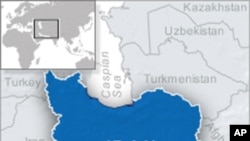Iran says that it has hanged an Iranian man whom it claims was working for the Israeli spy agency Mossad. Iran's prosecutor's office also claims that he fed classified information about the country's missile systems, military bases and fighter jets.
The hanging of Ali Akbar Siadat took place at Tehran's Evin prison early Tuesday and was announced by the Tehran prosecutor's office. Prosecutor Abbas Jaffar Dolatabadi told Iranian TV several days ago that Siadat was accused of giving classified information to Israeli spies.
Another man, Ali Saremi, was also hanged Monday. Iranian officials have repeatedly accused him of belonging to the People's Mojahedin organization.
Both hangings come several days after Iran postponed a decision to hang a Kurdish student Sunday, following an international outcry. Student Habibilah Latifi is accused of belonging to the Kurdish separatist group PJAK.
Al Arabiya TV reports that Iran has hanged an estimated 171 people since the beginning of 2010. The group International Campaign for Human Rights in Iran also claims that 300 people were hanged secretly this year in Mashad's Vakil Abad prison.
Former Iranian president Abolhassan Bani Sadr explained to VOA why the Iranian government is cracking down.
He said the Iranian government is having major domestic troubles following its decision to cut subsidies on consumer products, causing inflation and prompting it to turn cities into armed camps to avoid a popular backlash. He argued that the government needs to scare its people to cope with the situation and that hanging a man accused of being a Mossad agent, even though no one is sure of the claim, is a simple act that can be justified as patriotism.
'Show of strength'
Meir Javedanfar of the MEEPAS Center in Tel Aviv agrees that the Iranian government is trying to project an image of strength by carrying out the hangings.
"In all likelihood, this is a show of strength by the Iranian government because it feels weak and threatened by the strong reaction that the international community has shown towards the issue of human rights and now it wants to show strength elsewhere and the two accusations which the international community is not willing to resist is the issue of somebody being a Mossad agent or [belong to] the Mujahedeen," said Javedanfar.
Ali Nourizadeh of the Center for Arab and Iranian Studies in London stresses that there are major doubts about the government's claim that Siadat was a Mossad agent, since he was not a military man and had no access to military installations.
"I think that since [the government] had to postpone the execution of the Kurdish student and Ms. Sakineh Mohammadi [Ashtiani] they are just trying to say "we are in control, we are strong, we do whatever we want to do and nobody can prevent us and we are not going to make concessions because there is pressure by the Western organizations or governments," said Nourizadeh.
Former President Bani Sadr also points out that the government has been having so much trouble after its decision to cut subsidies for basic items such as gasoline and bread, that news reports say it's had to send agents out 740,000 times to investigate claims of price gouging.




